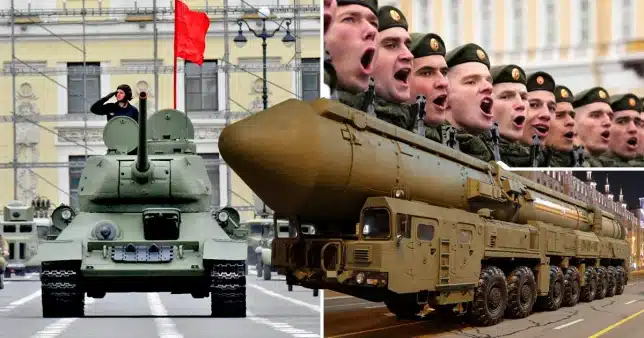Russia has sent a new symbolic message to the West by parading a nuclear missile through Moscow that is capable of striking any location in Europe.
As part of Thursday’s practice for the nation’s annual Victory Day celebrations next month, the RS-24 Yars intercontinental missile drove through the streets of the capital with convoys of armored vehicles and marching troops in tow.
Putin will use what is often a day of commemoration for the nation’s World War II dead to stir up enthusiasm for his hampered invasion of Ukraine for the second year in a row.
But he has been forced to scale back the show of force amid security threats and embarrassing reports of equipment and personnel shortages.

Several regions near the Ukrainian border have cancelled their parades, citing fears of disruption or attacks by defenders.
But the Atlantic Council think tank says generals ordered two of the cancellations as they didn’t have enough tanks to put together an impressive convoy.
The official explanations have also been marred by inconsistencies.
One Russian air commander claims to have uncovered a plot by Ukrainian forces to harass parades in Belgorod, Bryansk and Kursk – while simultaneously insisting that Russia’s air defences were impenetrable.
Yuri Knutov also suggested the drones could affect Moscow’s parade – but the Kremiln has repeatedly insisted the event in the capital will go ahead.
British intelligence chiefs say the day will also lay bare a ‘sensitive communications challenge’ for the Russian government.
Putin is said to be desperate to avoid any focus on the number of Russian soldiers dying in Ukraine – a closely guarded secret the Kremlin has refused to comment on for months.
In an update earlier this month, the Ministry of Defence said: ‘Putin couches the ‘special military operation’ in the spirit of the Soviet experience in World War Two.
‘The message risks sitting increasingly uneasily with the many Russians who have immediate insights into the mismanaged and failing campaign in Ukraine.
‘Honouring the fallen of previous generations could easily blur into exposing the scope of the recent losses, which the Kremlin attempts to cover up.’

